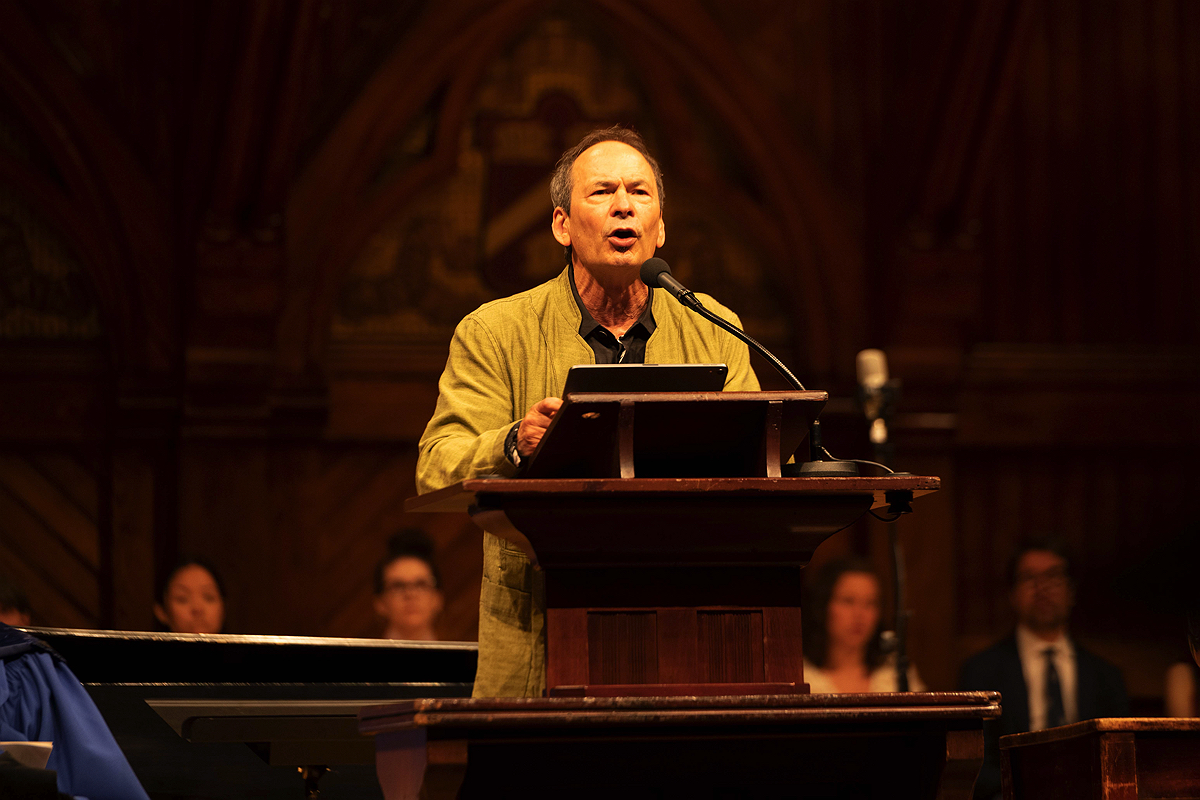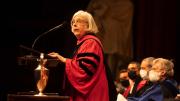“It’s tremendously exciting to have this celebration back,” said Howard Georgi, Mallinckrodt professor of physics, welcoming the audience at Sanders Theatre to the 230th Phi Beta Kappa (PBK) Literary Exercises on Tuesday morning, after a three-year hiatus that, “as far as I can tell,” he said, is the first such gap since the ceremony began at Harvard in 1872.
Matthew I. Potts, an Episcopal priest and professor of religious studies and literature, delivered the exercises’ invocation and benediction for the first time since being named Pusey Minister in the Memorial Church and Plummer Professor of Christian Morals in 2021. Potts offered a meditation on wisdom, drawing on the honor society’s motto: “Philosophia Biou Kybernetes,” (or in English, “Love of wisdom, the guide of life”).
Each in their own way, the morning’s two main speakers gave remarks that also centered around the search for wisdom: poet Forrest Gander, Seaver professor emeritus of literary arts & comparative literature at Brown University; and orator Theda Skocpol, Thomas professor of government and sociology.
The Teaching Prizes…and an Honorary Member
Logan McCarty, secretary of the PBK Alpha Iota chapter at Harvard (and assistant dean of science education and lecturer on physics and on chemistry and chemical biology), presented three honorees with Phi Beta Kappa Teaching Prizes. Nominated by the society’s undergraduate members and selected by its undergraduate marshals, they were:
- Adam Hesterberg, lecturer and assistant director of undergraduate studies for computer science, described in the citation as smart, empathetic, and someone who helps students “enjoy the fulfillment of solving a problem without feeling overwhelmed or abandoned.” Speaking briefly, Hesterberg dedicated his award to the memory of two academic mentors, mathematicians Alfonso Gracia-Saz and John Conway, both of whom died from COVID-19. Through his own teaching and that of his students who will become teachers, Hesterberg said, “their effect on the world will not end.”
- Peter Huybers, professor of Earth and planetary sciences and of environmental science and engineering (quoted briefly here), described as “a brilliant scientist” but “an even greater teacher and mentor in his generosity and kindness toward students.”
- Andrea Wright, lecturer in anthropology, assistant dean of the College, and Burr resident dean of Eliot House, whose teaching creates “infectious enthusiasm” among students. She is an educator, the citation read, “who takes seriously the importance of empowering students of all backgrounds.”
The chapter conferred only one honorary membership this year, on poet Forrest Gander. In past years, when alumni were on campus for the combined Commencement and reunions, members of the College 50th class were given honorary memberships, but this year, with the occasions now separate, that tradition has ended. (Skocpol was made an honorary of the Radcliffe PBK chapter in 1991). Also a novelist, essayist, photographer, and translator who was a Briggs-Copeland poet at Harvard before joining Brown’s faculty in 2001, Gander is the author of two novels and 15 books of poetry (plus numerous translations and multimedia collaborations with other artists). His 2018 collection, Be With, won the Pulitzer Prize in poetry; written after the sudden death of Gander’s wife of more than 30 years, the poet C. D. Wright, it probed questions of intimacy, profound loss, and unspeakable grief.
The Poet: The “Convergence” of Nature and the Human
If not a writer, Gander might have become a geologist. Born in California’s Mohave Desert and raised in Virginia (he also spent significant years in central Mexico and the Ozark Mountains of northwest Arkansas), Gander studied geology in college and was at one time planning on graduate school in paleontology. That background frequently surfaces in the themes and structures of his writing, which “addresses what it means to be human in the Anthropocene, and the place of poetry in the Anthropocene,” said Tuchman Levin professor in literature Karen Thornber in her remarks introducing Gander.

Forrest Gander
Photograph by Jim Harrison
That description includes the three poems he delivered in Sanders—“Immigrant Sea,” “Wasteland (for Santa Rosa),” and “Twice Alive” (I, II, and III)—all of which were excerpted from Twice Alive, a collection of ecological and love poetry published in 2021. In his own introductory remarks, Gander made note of “our historical moment of unprecedented human-generated environmental crisis”—and explained that much of the book draws on a 2,000-year-old literary tradition from southern India called Sangam, which he translated as “convergence.” In Sangam poetry, he said, “It was considered not only unethical, but impossible to write about human feeling as though it weren’t affected by the world around and in relation to the human.”
Twice Alive creates what the literary quarterly ALTA described as “emotionally striking poems focused on the existential, intimate role people play in the environmental tensions of our planet.” As part of his research for the book, Gander conducted fieldwork with a mycologist in a pristine forest at the edge of Lake Huron.
The book’s title poem follows directly from that research. In an author’s note, which he read aloud in Sanders, Gander pondered the “synergistic alliance” of fungus and algae that make up lichen, and the “transformative” nature of their collaboration: “With lichen, the original organisms are changed utterly in their compact. They can’t return to what they were….The thought of two things that merge, mutually altering each other, two things that, intermingled and interactive, become one thing that does not age, brings me to think of the nature of intimacy. Isn’t it often in our most intimate relations that we come to realize that our identity, all identity, is combinatory?”
Reading “Twice Alive,” Gander banged the lectern rhythmically with his hand to punctuate moments of insight or intensity, and his voice grew more vehement from one stanza to the next. The poem begins this way:
mycobiont just beginning to en-
wrap photobiont, each to become
something else, its own life and a
contested mutuality, twice alive,
algal cells swaddled in clusters
you take a 3-lens jeweler’s loupe to inspect the holdfast
of the umbilicate lichen then the rock-tripe lichen
then the irenic Amanita mushroom
swarming with a kind of mite that has no anus
then the delicious chanterelles called Trumpets of Death
supreme parsimony in drought
lets lichen live on
sporadic events
of dew and fog, a velvety
tomentum and the wet thallus
I crush oak moss between finger and thumb
for its sweet perfume persistent on
your skin when I touch your throat, so slow
to evaporate, the memory of seeing
sunburst lichen on the sandstone cliff
but if herbivores eat wolf lichen they
die and if carnivores eat it they die
writhing in pain with the exception of mice
it is rarely possible to tell
if lichen is dead or alive
The Orator: “Doing Matters More Than Being”
Skocpol spoke to PBK inductees about the “fundamental threats” their generation faces: “deadly conflicts, attacks on truth and scientific progress, and erosion of the very bedrocks that have supported inclusive civil society and democratic institutions” in the United States and around the world. (Read her address here.)
“On the march are real and aspiring tyrants who oppress and corrupt and pollute to empower and enrich themselves and their cronies,” Skocpol said. “Cynical grifters and rancid political provocateurs (some of them, sad to say, graduates of this and other elite colleges) abuse their platforms to stoke hatred and inspire violent attacks. Ready or not, and whether we like it or not, this is a critical juncture in U.S. and world history. Basic democratic principles are under manipulative and at times violent attack, with the spearpoint directed against competitive, fair, and honestly counted elections to install public officials and hold them accountable.”
She told the soon-to-be-graduates that they bore a “special obligation to recognize and meet what Martin Luther King Jr. once called ‘the fierce urgency of now.’” Academic achievement and PBK accolades “are not a prize,” she said. “They are a calling to do one’s utmost to serve the public good.” The audience applauded.
A scholar of American politics from a historical and comparative perspective, Skocpol has written about shifts in social policy, the struggle for racial equality, and the politics of healthcare reform. In 2012, she published (with co-author Vanessa Williamson, Ph.D. ’15) The Tea Party and the Remaking of Republican Conservatism, and in 2020, co-edited Upending American Politics: Polarizing Parties, Ideological Elites, and Citizen Activists from the Tea Party to the Anti-Trump Resistance. A new book, Rust Belt Union Blues: The Evolution of U.S. Working-Class Identities and Political Loyalties, is forthcoming from Columbia University Press.
At Sanders, Skocpol offered nuggets of practical advice: “Realize that moments of choice will come upon you abruptly—prompting you to decide how to balance and rebalance goals” of career and family in relation to the work of tackling social challenges. “So think hard, in advance…about what matters most for the community as well as yourself.” She added that “doing matters more than being”—credentials are no substitute for work—and that social progress requires “unswerving persistence” and that enduring organizations are built from broad collaborations. She also advocated “bold yet gradated” steps toward fundamental change. “Social change against obstructive power goes two steps forward, one step back,” she said, “so persistence to forge and wield collective clout outweighs detached political purity time and again.”
Which brought Skocpol to her final admonition: in the struggle for social change, it does not help to close oneself off from those who disagree. Recalling her fieldwork in far-flung corners of the United States, and her weekday breakfasts with her husband at a diner near Cambridge whose patrons “are varied in every way,” Skocpol said: “I urge all of you to find such settings in your lives—get out of your professional bubbles, hear what others have to say in their own words about community matters, including people who harbor views you cannot share. Fight all necessary battles with unswerving commitment and energy. But also find ways to listen to others and interact as an equal with a broad range of fellow citizens and human beings.”









